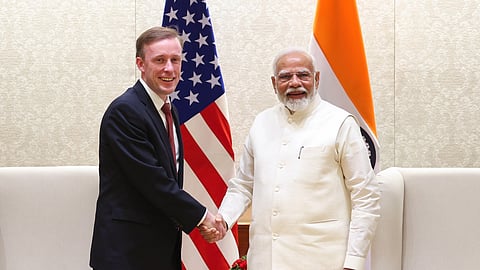

India and the US are working to ensure the continuity of their high-tech cooperation by solidifying commitments ahead of the Trump administration's transition this month, during the visit of outgoing U.S. National Security Advisor Jake Sullivan on January 5 and 6.
Sullivan will meet his Indian counterpart Ajit Doval and External Affairs Minister Dr. S. Jaishankar, besides highlighting the Indo-US high-tech and innovation alliance through the U.S.-India initiative on Critical and Emerging Technology (iCET) at a lecture at the Indian Institute of Technology, New Delhi.
Since 2021, Prime Minister Narendra Modi and President Joe Biden have relied on their national security advisors, Ajit Doval and Jake Sullivan, to drive and mediate inter-departmental policies to iron out differences on technology cooperation.
This has been aimed at expanding strategic cooperation, focusing on civilian and dual-use technologies, as well as the co-development of next-generation innovations.
“These efforts aim to mitigate the impact of the United States’ ongoing export control policies and have made substantial progress since Prime Minister Modi and President Biden announced the India-U.S. Initiative on Critical and Emerging Technologies (iCET) on the sidelines of the Quad Summit in Tokyo in May 2022. We need to continue with these efforts,” a person familiar with the subject said.
The objective is to ensure that the policy frameworks are firmed up to ensure continuity in forging closer ties between the governments, academia, and industry of the two countries in areas such as artificial intelligence, quantum computing, telecommunications, space, semiconductors, and biotechnology.
Policy continuity is necessary for India to ensure some of its ongoing plans such as establishing at least six ATMP (Assembly, Testing, Marking, and Packaging) semiconductor units by 2026, especially in the context of America First policy of President Donald Trump.
Achieving this target would secure India a significant position in the global semiconductor supply chain.
“A stable policy framework is essential to maintain high-tech cooperation between the two countries, particularly in light of discussions surrounding the "Make in America" and "America First" policies of the incoming presidency. Ensuring both nations remain committed to this stability is crucial for continued collaboration,” pointed out Pramit Pal Chaudhuri, foreign policy analyst and Head of India Practice, Eurasia Group.
Prime Minister Modi and President Biden praised the signing of the MoU on Semiconductor Supply Chain and Innovation Partnership as a major milestone in aligning the semiconductor incentive programs of both countries.
This collaboration will foster commercial opportunities, research, and talent and skill development.
The leaders also welcomed Micron Technology's announcement to invest up to $825 million in building a new semiconductor assembly and test facility in India, supported by the Indian government. The total $2.75 billion investment is expected to create up to 5,000 direct jobs and 15,000 community jobs over the next five years.